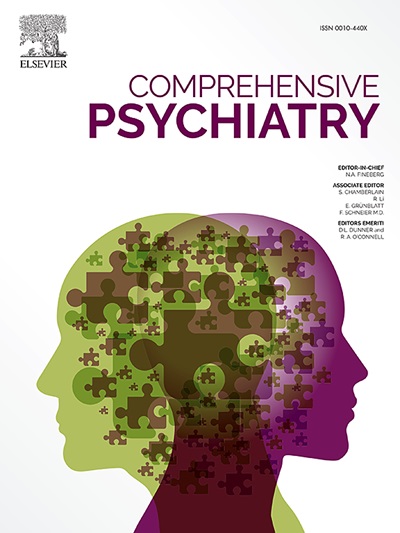Resilient coping during the Russian-Ukrainian war: Does it buffer the effects of cumulative trauma on ICD-11 posttraumatic stress disorder symptoms?
IF 4.2
2区 医学
Q1 PSYCHIATRY
引用次数: 0
Abstract
Background
Individuals with higher resilient coping may manage war-related trauma better than individuals with lower resilient coping. If so, resilient coping may weaken the relationship between war trauma and posttraumatic stress disorders.
Objective
This study aimed to investigate the role of resilient coping in moderating the associations between cumulative war trauma exposure and ICD-11 posttraumatic stress disorders during war.
Methods
This cross-sectional study included N = 851 Ukrainian students living in the Ukraine between December 2022 and January 2023 during the Russian-Ukrainian war. We tested a model in which resilient coping was specified as a moderator of the effect of war-related cumulative trauma exposure (Harvard Trauma Questionnaire-R) on ICD-11 posttraumatic stress disorder (PTSD), and disturbances in self-organization (DSO) symptom levels (International Trauma Questionnaire-R), respectively. We used Structural Equation Modeling and controlled our analysis for previous trauma exposure, gender, years of study, and level of income.
Results
In contrast to our hypothesis, the level of resilient coping did not moderate the effect of cumulative war trauma exposure on PTSD and DSO symptom levels. Instead, we found a strong direct effect of the level of resilient coping on PTSD and DSO symptom levels.
Conclusions
Resilient coping may directly affect the level of PTSD and DSO symptoms but may not weaken the association between trauma exposure and posttraumatic stress disorders during war.
俄乌战争期间的弹性应对:它是否缓冲了累积创伤对ICD-11创伤后应激障碍症状的影响?
背景:具有较高弹性应对能力的个体可能比具有较低弹性应对能力的个体更好地处理与战争有关的创伤。如果是这样,弹性应对可能会削弱战争创伤和创伤后应激障碍之间的关系。目的探讨弹性应对在战时累积战争创伤暴露与ICD-11创伤后应激障碍之间的调节作用。方法横断面研究纳入了2022年12月至2023年1月俄乌战争期间生活在乌克兰的N = 851名乌克兰学生。我们测试了一个模型,其中弹性应对被指定为战争相关累积创伤暴露(哈佛创伤问卷-r)对ICD-11创伤后应激障碍(PTSD)和自组织紊乱(DSO)症状水平(国际创伤问卷-r)的调节作用。我们使用了结构方程模型,并控制了之前创伤暴露、性别、学习年限和收入水平的分析。结果与我们的假设相反,弹性应对水平并没有调节累积战争创伤暴露对PTSD和DSO症状水平的影响。相反,我们发现弹性应对水平对PTSD和DSO症状水平有很强的直接影响。结论弹性应对可能直接影响创伤后应激障碍和DSO症状的水平,但可能不会削弱创伤暴露与战争期间创伤后应激障碍之间的关系。
本文章由计算机程序翻译,如有差异,请以英文原文为准。
求助全文
约1分钟内获得全文
求助全文
来源期刊

Comprehensive psychiatry
医学-精神病学
CiteScore
12.50
自引率
1.40%
发文量
64
审稿时长
29 days
期刊介绍:
"Comprehensive Psychiatry" is an open access, peer-reviewed journal dedicated to the field of psychiatry and mental health. Its primary mission is to share the latest advancements in knowledge to enhance patient care and deepen the understanding of mental illnesses. The journal is supported by a diverse team of international editors and peer reviewers, ensuring the publication of high-quality research with a strong focus on clinical relevance and the implications for psychopathology.
"Comprehensive Psychiatry" encourages authors to present their research in an accessible manner, facilitating engagement with clinicians, policymakers, and the broader public. By embracing an open access policy, the journal aims to maximize the global impact of its content, making it readily available to a wide audience and fostering scientific collaboration and public awareness beyond the traditional academic community. This approach is designed to promote a more inclusive and informed dialogue on mental health, contributing to the overall progress in the field.
 求助内容:
求助内容: 应助结果提醒方式:
应助结果提醒方式:


